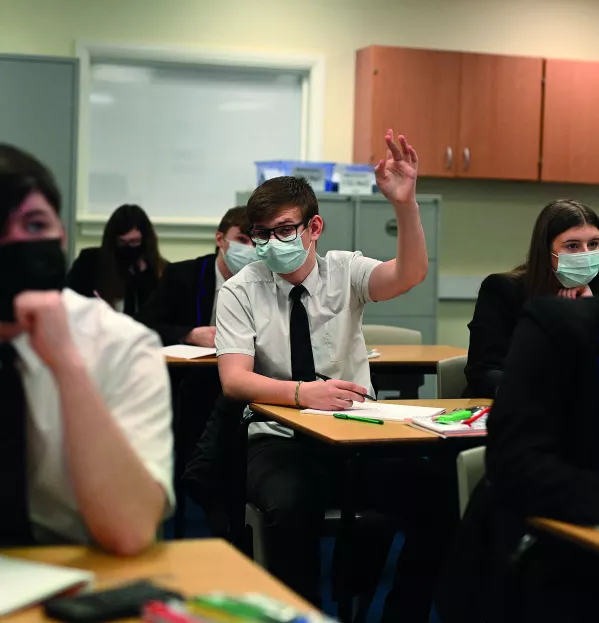- Home
- Teaching & Learning
- Secondary
- SQA guidance ‘makes in-house exams an inevitability’
SQA guidance ‘makes in-house exams an inevitability’

Teachers’ frustration last week was palpable after first minister Nicola Sturgeon told a journalist at a Covid-19 briefing that there was “no requirement to replicate a full exam or a prelim this year”.
One secondary leader writing for Tes Scotland described the comments as “disingenuous” and “misleading”, and accused Sturgeon of putting schools in an impossible position, given the type of assessments (essentially classroom-based exams) they would be running after the Easter break. The school leader said that now they would have parents questioning their approach as a result of Sturgeon’s comments.
So, why the mixed messages?
The Scottish Qualifications Authority has left the door ajar for schools to go off piste and do things differently, but read the SQA guidance and you quickly get a feel for the risks that schools run if they opt for anything other than an assessment in controlled conditions - that is, an exam.
Next, consider what is at stake - which is, of course, young people’s future prospects - and you quickly realise why so many schools are unwilling to base provisional results on evidence that may ultimately be deemed by the SQA to be of insufficient quality.
One secondary school leader told me that councils were clear when the exams were cancelled that they should not be replaced with in-house exams - but that everything changed when the SQA guidance was published.
This is because, at the same time as telling schools that they do not need to run prelims this year, the SQA is supplying them with exam papers and telling them that prelims or mock exams - or whatever you choose to call them - “are likely to be the most reliable indicator of performance in a question paper, particularly if they are undertaken in the same conditions”.
The guidance also says: “Evidence that is similar to a course assessment will have stronger predictive value than evidence that is considerably different from the course assessment.”
It adds: “If evidence is generated under less strict conditions than a course assessment, its predictive value is weaker than a piece generated under similar conditions.”
And why cram all these assessments into the final term? Because, the SQA guidance makes clear, evidence “generated earlier in the course of study may have lower predictive value than evidence generated later”.
Of course, the move to remote learning after Christmas has also had an impact on schools’ evidence-gathering plans. Some schools were due to run prelims in January but the pandemic made this impossible.
Professor Mark Priestley - who led the independent review of the 2020 results debacle - told the Scottish Parliament’s Education and Skills Committee back in November that he hoped to see “a mixed economy of assessment methods” this year and “a move away from a reliance on pencil and paper testing, including in exams”.
But the SQA guidance advises that classwork is “unlikely to form a strong evidence base on its own”. The SQA says “it may be possible to gauge candidate performance from a review of coursework” - but this is nowhere near the ringing endorsement that prelims and mock exams receive.
On 8 December, the day he confirmed that all of the usual exam diet had been cancelled once again, education secretary John Swinney said that “the question is less whether we can hold the exams safely in the spring and more whether we can do so fairly”.
Since then, there has, of course, been another lengthy period of remote learning. But there is little sign of the model he promised, which would be “more flexible to the specific circumstances of the individual pupil”. Neither is there much in the way of wiggle room for teachers to bring their professional experience and expertise to bear. This year, teachers are being told to base their estimates only on the evidence a student has managed to generate, not a candidate’s “demonstrated and inferred attainment”, as was the case in 2020.
Whether it was the government’s intention or not, exams are at the centre of the alternative certification model in 2021 - and students will be judged on their performance in these.
Emma Seith is a reporter at Tes Scotland. She tweets @Emma_Seith
This article originally appeared in the 16 April 2021 issue under the headline “Teachers vexed that SQA guidance makes in-house ‘exams’ an inevitability”
You need a Tes subscription to read this article
Subscribe now to read this article and get other subscriber-only content:
- Unlimited access to all Tes magazine content
- Exclusive subscriber-only stories
- Award-winning email newsletters
Already a subscriber? Log in
You need a subscription to read this article
Subscribe now to read this article and get other subscriber-only content, including:
- Unlimited access to all Tes magazine content
- Exclusive subscriber-only stories
- Award-winning email newsletters
topics in this article



